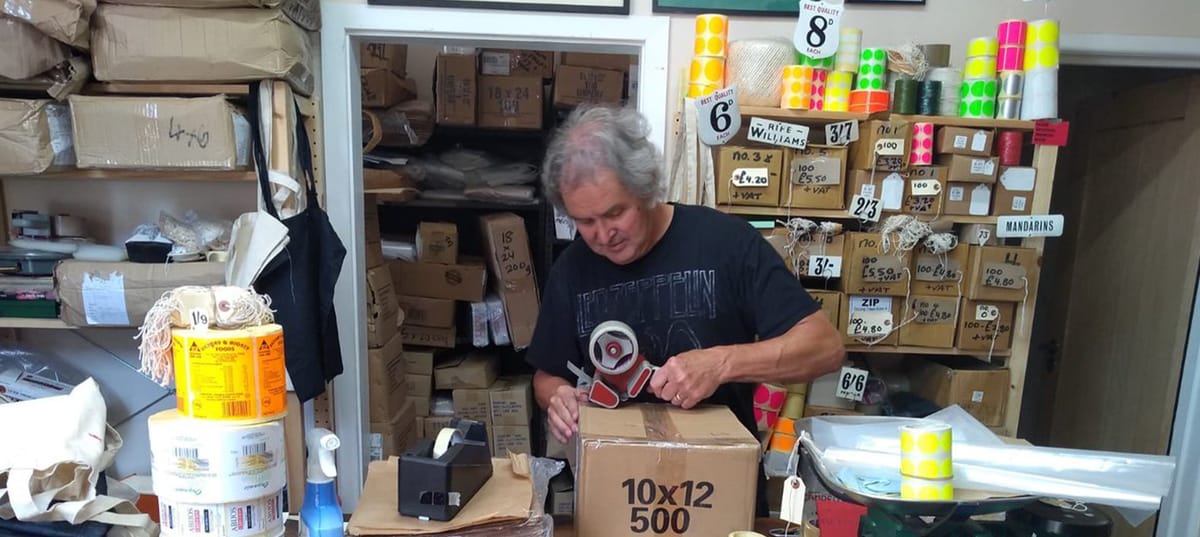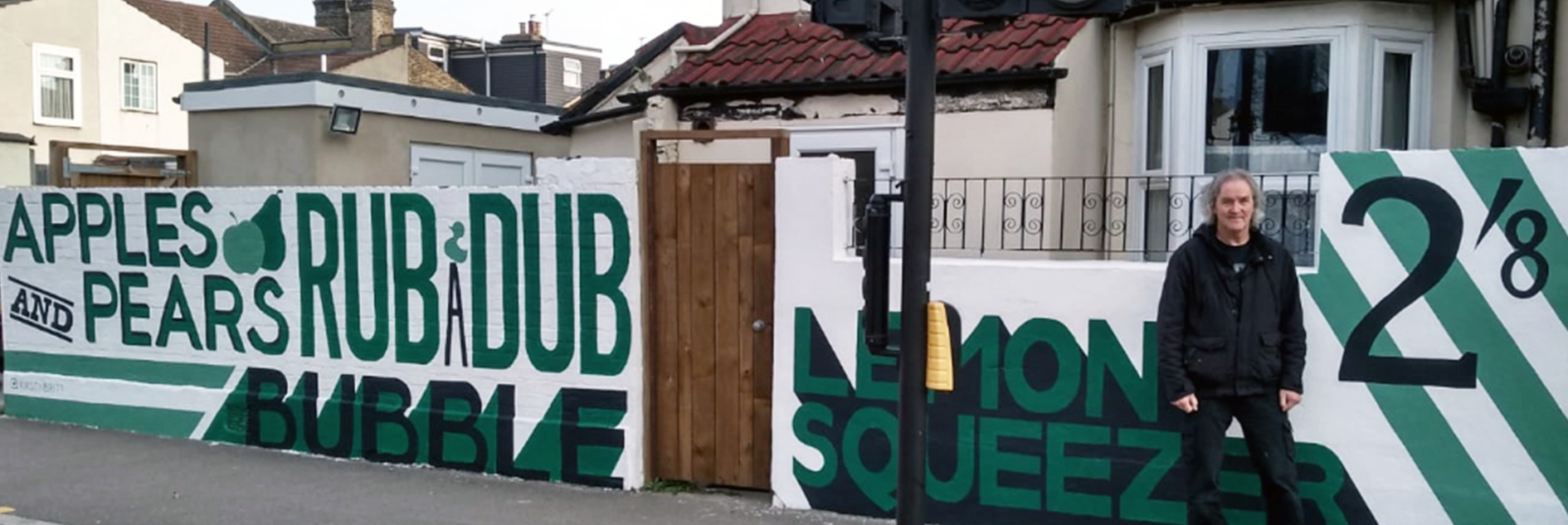Gardners' Bags

After 150 years, trading in the same area, Gardners’ Bags had to move. Founded in 1870, originally manufacturing and repairing grocer’s scales, the store supported the markets in the East End of London. But the area changed, big brands moved in pushing up rent and rates, the location was no longer affordable for this specialist shop.
We spoke to Paul Gardner, the fourth generation of the family to run the business. He told us many stories about how the shop changed and about living and working in the East End.
“I started working in the shop 48 years ago when I was 17, the day after I finished school. My mum had been running the shop since my dad died in 1968 when I was 13. I took over the day-to-day running, with help from my uncle. I wore a suit for my first three days but it wasn’t right for the shop. I was shy as a child and even though I was used to being in the shop, I used to sit on the counter when I was small, it was a steep learning curve to learn how to run it.
Uncle Tim would get to the shop at 5.45am, I’d arrive at 6.15. We opened early as the traders came to us to get their bags and carriers before they opened their shops. We closed after lunch. For the first 26 years I worked six days a week except for the time I got a football injury and couldn’t work!”
Early days
“We’ve always been based in this area, close to the markets. We started off in the 1870s making and repairing weighing scales, the type with the weights on the back. Then, we used a horse and cart to travel round a 10-mile radius to all the markets. We had a shop on City Road and then moved to Commercial Street in the Peabody building. The shop was pretty basic. The rent was 2 shillings and 6 pence -12.5p a week. We had space in the basement and a flat above where my nan later lived. She used to bring my lunch down to me. We didn’t own the space. We didn’t need to. The business was thriving. As the needs of the market traders changed, we moved from scales to other sundries including paper and plastic bags and labels. We had our own printing press in the basement.
We had all sorts of customers – not just the greengrocers of Petticoat Lane and Spitalfields but the clothing retailers and East End people. There were some really colourful characters including shady ones I only knew by their nicknames. Lots of my customers became my friends.
In the 1980s we moved five doors down while Peabody modernised. They’d wanted to pull the whole building down as it didn’t have inside toilets or plumbing but a preservation order meant they couldn’t. Once the work was done, they offered to sell units to the businesses and residents but we all had to agree. Two pulled out at the last minute so it all fell through. In the end it was sold to a private company who bought the whole thing.”
Leyton
“In 1991, the fruit market moved to Leyton so we opened another unit there. Mum said we should close the Spitalfields shop but we kept it on. Mum and my sister ran Leyton until 15 years ago after which it was converted into a residential flat. Commercial Street did go down a bit but we diversified. Then two years ago, the day after visiting my dad’s grave on the 50th anniversary of his death, the tenant who lived in Leyton said he needed to move – right at the time I felt the Spitalfields shop was becoming untenable. It felt like it was a sign from my dad. The rent and rates by then were over £1000 a week. It had been pretty stressful to carry on covering that. I was used to living on not much money but trading from there was part of the heritage. I didn't want to be the one to move from the shop after 150 years.“
Looking ahead
“So, in January 2020 we moved out and reopened the Leyton shop. Really it was just in the nick of time. Just another month and we might not have been able to carry on. If I’d been at Spitalfields through the lockdowns, I would have gone bankrupt. Here at least, my overheads are lower and we can keep going.
Many of my old customers and friends helped me move. It was amazing. We packed seven van-loads of stuff. We had a party on the last night. The new shop is very small by comparison. Initially the new shop was very messy – I couldn’t get to the telephone for a week! – and it has taken a while to sort it all out. We don't get the passing trade we used to get but most of my customers have stayed loyal. Two art students painted a cockney rhyming slang mural on the side of the building. It helps cheer the area up and puts the history back in front of people.

During lockdown, I’ve been doing deliveries like everyone else. It is pretty quiet at the moment but I get a diverse trade. Beigel Bake, the famous bagel shop on Brick Lane is one of my best customers. Independents around the markets still use me and I have lots of Nigerian and Ghanaian customers.
Most of our stock still comes from within the UK. I have unique stock and I sell it at a fair price, not a huge profit. I could charge more but I prefer to do it as cheap as I can. It is a community thing. I prefer people to come to me and don't feel they have been ripped off.”
The East End
“The shop has a wonderful archive. I have all our trading books, the family bible from 1892 and lots of old pictures. My grandfather left for France at the start of WWI but was called back at Dover because there was a shortage of scale makers. His brother was killed in the medical core. There is a memorial plaque to him in Christ Church Spitalfields where some of my other relatives got married.
I’ve been in the East End all my life. It is an amazing place as it is so diverse. We stick together. When my landlord wanted to put our rent up by 70%, local people helped me to fight back. It was a really stressful time as the landlord was really bullish. He said that we’d had our time and he wanted us out. Spitalfields Life ran an article about us and we had some press coverage which all helped. Eventually we negotiated to a reasonable point.
This experience also led to us launching the East End Trades Guild which now has around 300 members – local businesses and people who are self-employed. We support each other and award grants and campaign for affordable rents for all small businesses in the area. We’ve gained lots of press interest from this and ran a petition against the increase in business rates which we took to Downing Street. It got 11k signatures in 2-3 weeks. At the time, the rates in our area increased massively as large brands moved in. For some it has gone up by 300%, it is just impossible to survive on that. The character of the place is changing, we’re getting swept away. There were some really unusual and brilliant shops in the market – like the joke shop – but they just couldn’t afford to stay. Our campaign helped to mitigate this.
If we work together as small businesses, we can bring about positive change.
Things are tough at the moment. Many of my customers are closing. But we’ll get through this. The trade has gone full circle from paper bags to plastic and back to paper again. There are not many shops to go where you can buy this stuff. I still feel motivated to carry on. I always say to ‘look on the bright side of life’. If we can survive now, we can survive anything.
If you run an independent business and would like to feature in one of our blog posts then we'd love to hear from you! Email us at info@expressioninsurance.co.uk and one of the team will be in touch.
Follow Gardners' Bags on social media to keep up to date with their story:
